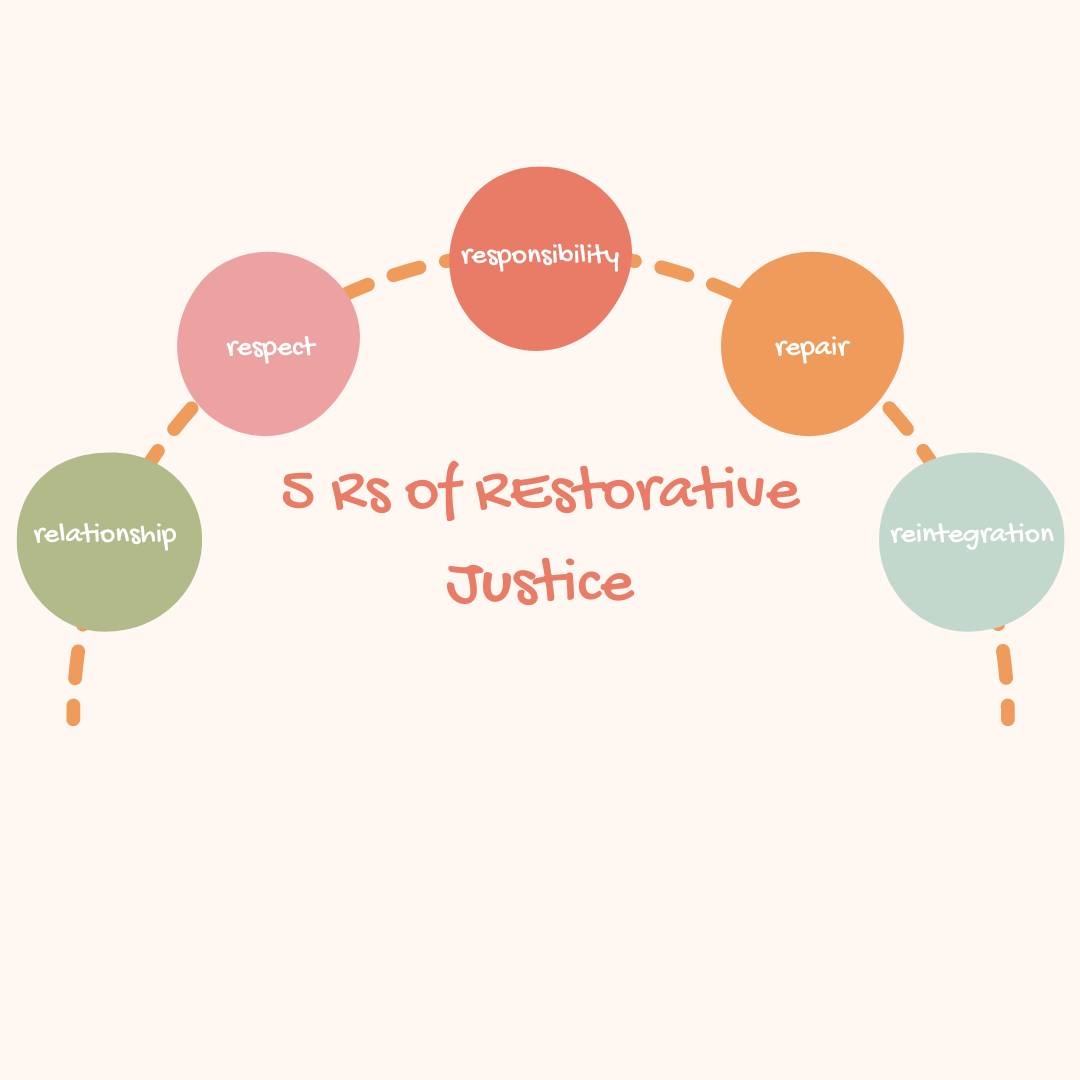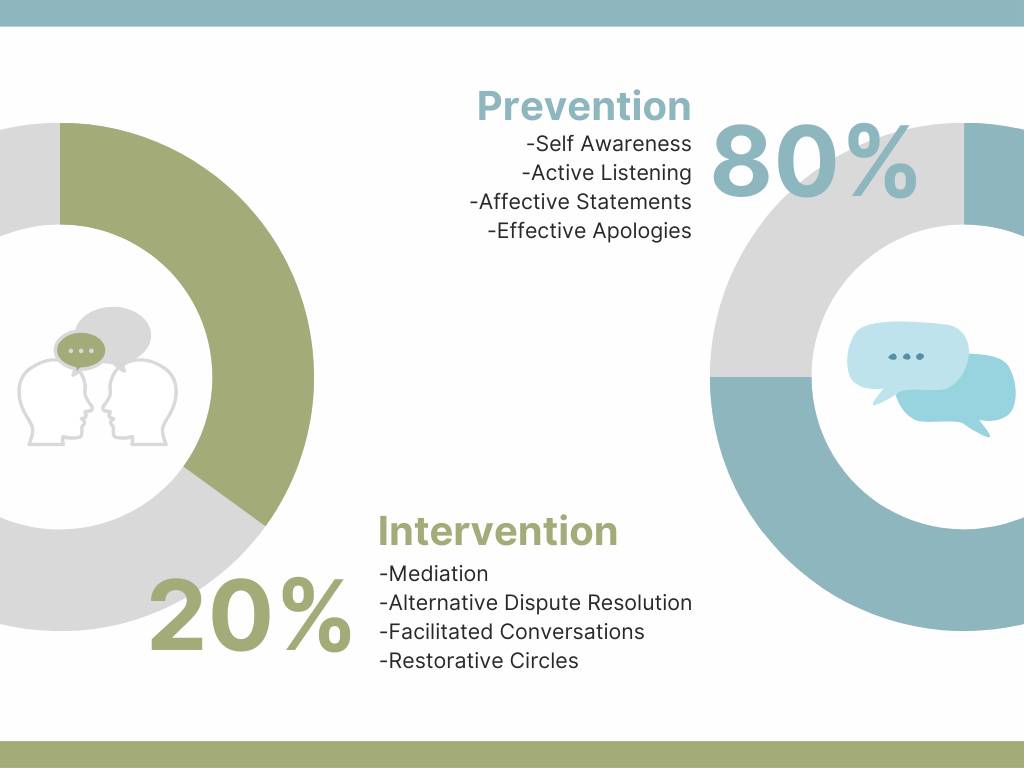Restorative Based Conflict Prevention & Alternative Dispute Resolution
Conflict is a natural and expected aspect of personal and workplace relations. When navigated constructively, conflict can foster innovative solutions and ultimately strengthen trust among team members.
GVSU Human Resources approaches conflict prevention and alternative dispute resolution (ADR) using a Restorative Practices lens.
Rooted in peacemaking and justice practices of Native American, First Nation, and other Indigenous peoples, Restorative Practices seek to acknowledge harm, repair relationship, and strengthen community.
Learn more about your approach to conflict
Strengthen your communication and conflict management skills
Deepen your knowledge of restorative practices
- What is conflict? (Lumen Learning)
- Tools and Resources for Conflict Resolution (edX)
- Five Styles of Responding to Conflict (Riverhouse ePress)
- Conflict Styles Assessment (United States Institute of Peace)
- Conflict Management Style Assessment (Reginald (Reg) Adkins, PhD, Elemental Truths)
- What's Your Conflict Management Style? (Walden University)
- 5 Conflict Management Styles and When to Use Them (Business Management Daily)
Access related Academic Impressions on-demand content - log in via your GVSU credentials:
- Inclusive Communication: A Training for Higher Ed Leaders, Personal Development & Skill Building
- Using Empathy and Humility to Help Build Community
- Conflict Resolution: It’s What You Said AND How You Said It
- Conflict Management: A Practical Workshop for Leaders
- Learning to Lead Through Conflict
- Build a Team Culture that Embraces Conflict
Browse additional opportunities in Workday Learning
- International Institute for Restorative Practices
- The Restorative Practices Handbook
- What is Restorative Justice? Hartford Justice Center
- Restorative Practices: What Are They and Why Are They Important for Workplace Conflict? Aspen Restorative Consulting, New Zealand
- Restorative Practice: History, Successes, Challenges & Recommendations (Marsh, V., Center for Urban Education Success, 2017)
Introduction to Restorative Approaches
Alternative Dispute Resolution (ADR) is a voluntary, informal approach to conflict resolution which utilizes a trained neutral third party facilitator. To learn more about ADR offerings and our restorative based conflict resolution process, please contact your HR Business Partner or submit a referral below.
What is Restorative Practices?
|
Restorative-Based ADR Is... |
Restorative-Based ADR Is Not... |
|---|---|
|
A voluntary, participatory, individualized process |
An investigatory, punitive or disciplinary process |
|
A method of private, informal conflict resolution |
A method of evidence gathering or determination of responsibility or guilt |
|
Focused on the acknowledgement of impact and the restoration of relationship for the future |
Focused on punishment or retribution |
|
An opportunity for perspective sharing, empowerment, accountability, learning, and relationship building |
An opportunity for humiliation, lecturing, or blame |

Restorative Practices Tools
Affective Statements
- Nonviolent Communication (Positive Psychology, 2020)
- Non-Violent Communication Model (UC Santa Cruz)
- Affective Statements (Los Angeles Unified School District, 2020)
- Restorative Practices Part 1: Affective Statements and Community Circles (Boards of Cooperative Educational Services, New York, 2019)
Active Listening
- Active Listening Skills (Her Honor Mentoring)
- 7 Active Listening Techniques For Better Communication (Verywell Mind, 2024)
- What Is Active Listening? (Harvard Business Review, 2024)
Effective Apologies
- The 6 Elements of an Effective Apology, According to Science (Ohio State University, 2016)
- Mastering the Art of Apology Through Restorative Justice (Elearn College, 2024)
- Sorry, Not Sorry: The Balancing Act of Workplace Apologies (V & CO Coaching & Consulting)
- The Power of Apologies (Ombuds Office at UC Boulder, adapted from Apologies by Marsha L. Wagner)

Fair Process/Inclusive Decision Making
- Using Fair Process to Make Better Decisions (The Management Center)
- Fair Process: Managing in the Knowledge Economy (Harvard Business Review, 2003)
Social Discipline Window
- Social Discipline Window (United Kingdom Department of Education)
- Social Discipline Window (Dee Lindenberger with Strategic Alternatives in Prevention Education)
General Resources
- Restorative Communication Handout (Spokane Public Schools, 2019)
- A Restorative Conversation Toolkit (Project Nia, Chicago, 2021)
- Restorative Practices: A Toolkit for Educators (Santa Clara County Office of Education, 2022)
- Introduction to Restorative Conversations (Abolitionist Toolbox)
- Restorative Practices vs. Restorative Justice (ReSolutionaries, Inc.)
- Gryphon Place Restorative Practices
Related GVSU Opportunities & Resources
- Padnos/Sarosik Center for Civil Discourse
- Civil Discourse Conversation Guidelines
- The Laker's Guide to Civil Discourse: An Honors Senior Project by Samantha Johnson
- Talking Together: Strengthening Our Communities Through Conversation
- Pace Initiative for Connecting Mind and Health
- Personal Concern Self Help Resources
- Practicing Mindfulness
A History of Restorative Work at GVSU
- Restorative-Based Alternative Dispute Resolution K. Evans, C. Grooms, Reach Higher Showcase 2023
- Alternative Dispute Resolution Needs Assessment Survey Results, E. Ortega-Schultz, E. Shupe, 2022
- Four Essential Skills for Managing Differences and Resolving Conflict J. Hodge, Ph.D., 2011
- A Study of Mediation Practices in Higher Education Institutions in the Midwest D. Pace, S. Swift, M. Bedikian, CUPA-HR Journal, Fall/Winter 2005
